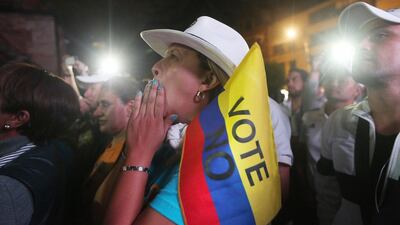Bogota // The Colombian government and Farc rebels scrambled on Monday to save a peace deal after voters narrowly rejected it in a referendum.
The shock result threw the four-year peace process into uncertainty and prompted the government’s chief peace negotiator to offer his resignation.
The leader of the Revolutionary Armed Forces of Colombia vowed the rebels were prepared to “fix” the deal.
UN Secretary General Ban Ki-moon, who had offered a UN team to oversee the disarmament process, said he had “urgently” sent his Colombia envoy to Havana, where the peace talks were held, for new consultations.
But the outcome left no clear way forward to end a half-century conflict that has killed more than 260,000 people.
“Colombia is in uncertain territory,” said Angelika Retteberg, an expert on the peace process at the University of the Andes in Bogota.
The peace deal had been hailed as historic from the time it was concluded on August 24 to the moment it was signed last week in the presence of UN chief Mr Ban and US secretary of state John Kerry.
Resentful of the blood shed by the Marxist guerrillas and the lenient punishment the deal meted out for their crimes, voters rejected it on Sunday by a razor-thin margin: 50.21 per cent for the “No” camp to 49.78 per cent for “Yes.”
Low turnout of just over 37 per cent also proved fatal.
The head of the government’s delegation to the peace talks, Humberto de la Calle, offered his resignation to President Juan Manuel Santos, who has staked his legacy on ending the conflict.
“Any mistakes we made are my responsibility alone,” Mr De la Calle told journalists at the presidential palace.
“will not be an obstacle to what comes next.”
That could pave the way for new negotiations, with a government team including hardliners from the party of Mr Santos’s top political rival, former president Alvaro Uribe, who led the “No” campaign.
Farc leader Rodrigo Londono indicated the rebels were open to new talks, saying the referendum result left them “much more committed” to peace.
“There are various ways to read [the result] and we must analyse them to see what needs to be fixed,” said Mr Londono, better known as Timoleon “Timochenko” Jimenez.
Opinion polls had showed the “Yes” camp well ahead, and negotiators had said there was no Plan B in the event of a “No” vote.
Mr Santos admitted defeat, but pledged not to give up.
“I will continue to seek peace to the last day of my term,” he said late on Sunday.
Forecasts apparently miscalculated Colombians’ desire to punish the Farc.
Deal opponents resented concessions that included soft sentences with no jail time for rebels who confessed to their crimes.
The accord called for the 5,765 Farc rebels to disarm and become a political party, with seats in Colombia’s Congress.
The FARC launched its guerrilla war in 1964, after the army crushed a peasant uprising.
Over the years, the conflict drew in several leftist rebel groups, right-wing paramilitaries and drug gangs.
Authorities estimate it has left 45,000 missing and nearly seven million uprooted.
The two sides have declared a ceasefire, and the Farc indicated their committment to upholding it.
* Agence France-Presse

